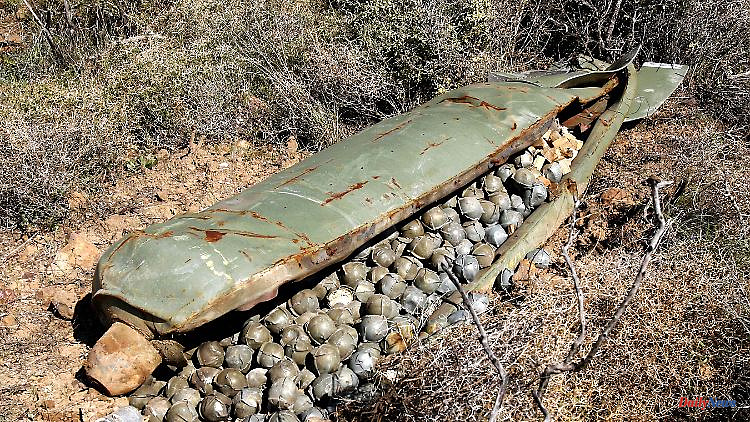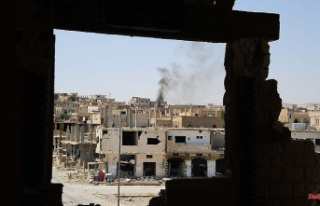The artillery barrage in the trenches in eastern Ukraine empties the armories. At the Munich Security Conference, the deputy prime minister proposes a delivery of banned cluster munitions. Kiev also has new ideas on how to proceed in the debate about fighter jets.
Ukraine is demanding controversial cluster munitions and phosphorus incendiary weapons from its Western backers for the fight against Russia. The United States and several other allies would have millions of shots from it, said Deputy Prime Minister Olexander Kubrakow in the evening at the Munich Security Conference. Russia uses this type of weaponry every day. "Why can't we use them? It's our territory," he said. He understands the difficulties because of conventions. But this type of ammunition can help to withstand the attackers.
Kubrakov was alluding to the fact that the use of cluster munitions is outlawed under international law. Cluster munitions are rockets and bombs that burst in mid-air over the target, releasing many small explosive devices. Phosphorus munitions can cause severe burns and poisoning in humans.
A 2008 convention prohibits, among other things, the use of cluster munitions and stipulates the destruction of stocks. 123 states have signed the treaty. Among them are 24 NATO countries, but not the USA. Neither Russia nor Ukraine are part of the agreement. The Cluster Munitions Coalition is made up of non-governmental organizations from around the world that monitor compliance with the Convention.
Kubrakov also campaigned again for the delivery of fighter jets. The subject is difficult, but why not at least start training programs for Ukrainian pilots, he asked. Polish Prime Minister Mateusz Morawiecki made it clear that his country would be ready to join other allies in supplying fighter jets to Ukraine. However, he named a "NATO decision" as a prerequisite for such a step. Asked whether Poland would also hand over US-made F-16 fighter jets to Ukraine, he said Poland does not have that many aircraft of this type. But others could be delivered. He did not comment on the type. According to data from the International Institute for Strategic Studies (IISS), in addition to the F-16, Poland also recently had Soviet-type MiG-29 and Su-22 combat aircraft.
Last March, the then Commander-in-Chief of the US Forces in Europe, Tod D. Wolters, said on the subject of fighter jet deliveries that the transfer of MiG-29s could be misunderstood by Moscow's intelligence services and could result in an escalation between Russia and NATO result. This is a high-risk scenario, the four-star general said. The minority leader in the US Senate, Mitch McConnell, expressed himself significantly differently than Wolters. The Republican said he would give F-16s to Ukraine if he had the choice. The democratic US President Joe Biden and Federal Chancellor Olaf Scholz have so far not wanted to deliver such weapon systems to Ukraine.
Just as with the tanks, one can responsibly say in advance "that the problem of the planes will be solved," said Ukrainian Foreign Minister Dmytro Kuleba, according to the Kiev media in Munich. "It will take a little more time." The discussion about the planes will be structured differently. "But that work has already begun," Kuleba said.












